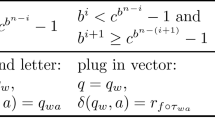Abstract
The notion of descriptional complexity or algorithmic information, also known as Chaitin-Kolmogorov complexity, was defined in the ’60s in terms of minimal description length [14, 17]. This concept was extended in 2012 in two papers, each using a different approach. One of the papers studies properties of the complexity function, and uses the notion of encoded function space; the other one extends Blum axioms for static complexity, and defines Blum static complexity spaces. In formal language theory we also use the concept of descriptional complexity for the number of states, or the number of transitions in a minimal finite automaton accepting a regular language, and apparently, this number has no connection to Chaitin-Kolmogorov complexity. In this paper we establish such a connection by extending the notions of Blum static complexity and of encoded function space.
Access this chapter
Tax calculation will be finalised at checkout
Purchases are for personal use only
Preview
Unable to display preview. Download preview PDF.
Similar content being viewed by others
References
Blum, M.: A machine-independent theory of the complexity of recursive functions. Journal of the ACM 14(2), 322–336 (1967)
Blum, M.: On the size of machines. Information and Control 11, 257–265 (1967)
Boucher, C.: Leçons sur la théorie des automates mathématiques. Lecture Notes in Operations Research and Mathematical Systems, vol. 46. Springer, Berlin (1971)
Burgin, M.: Generalized Kolmogorov complexity and other dual complexity measures. Translated from Kibernetica 4, 21–29 (1990) (Original article submitted June 19, 1986)
Burgin, M.: Algorithmic complexity of recursive and inductive algorithms. Theoretical Computer Science 317, 31–60 (2004)
Burgin, M.: Algorithmic complexity as a criterion of unsolvability. Theoretical Computer Science 383, 244–259 (2007)
Calude, C.: Information and Randomness - An Algorithmic Perspective. Springer, Berlin (1994)
Calude, C.: Theories of Computational Complexity. North-Holland, Amsterdam (1988)
Calude, C.: Theory of Algorithms, University of Bucharest, Bucharest (1987) (in Romanian)
Calude, C., Salomaa, K., Roblot, T.K.: Finite State Complexity and Randomness. Technical Report CDMTCS 374 (December 2009/revised June 2010)
Câmpeanu, C.: A Note on Blum Static Complexity Measures. In: Dinneen, M.J., Khoussainov, B., Nies, A. (eds.) Computation, Physics and Beyond. LNCS, vol. 7160, pp. 71–80. Springer, Heidelberg (2012)
Câmpeanu, C.: Randomness in Blum Universal Static Complexity Spaces. Accepted to Journal of Automata Languages and Combinatorics (2012)
Câmpeanu, C., Ho, W.H.: The maximum state complexity for finite languages. Journal of Automata, Languages and Combinatorics 9(2-3), 189–202 (2004)
Chaitin, G.J.: A Theory of Program Size Formally Identical to Information Theory. Journal ACM 22(3), 329–340 (1975)
Chaitin, G.J.: Algorithmic Information Theory. Cambridge Tracts in Theoretical Computer Science, vol. I. Cambridge University Press (1987)
Jürgensen, H.: Invariance and universality of complexity. In: Dinneen, M.J., Khoussainov, B., Nies, A. (eds.) Computation, Physics and Beyond. LNCS, vol. 7160, pp. 140–158. Springer, Heidelberg (2012)
Kolmogorov, A.N.: Problems Inform. Transmission 1, 1–7 (1965)
Konstantinidis, S.: Private Communication to Cezar Câmpeanu at DCFS 2008 (2008)
Loveland, D.A.: On Minimal-Program Complexity Measures. In: STOC, pp. 61–65 (1969)
Author information
Authors and Affiliations
Editor information
Editors and Affiliations
Rights and permissions
Copyright information
© 2013 Springer-Verlag Berlin Heidelberg
About this paper
Cite this paper
Câmpeanu, C. (2013). Blum Static Complexity and Encoding Spaces. In: Jurgensen, H., Reis, R. (eds) Descriptional Complexity of Formal Systems. DCFS 2013. Lecture Notes in Computer Science, vol 8031. Springer, Berlin, Heidelberg. https://doi.org/10.1007/978-3-642-39310-5_1
Download citation
DOI: https://doi.org/10.1007/978-3-642-39310-5_1
Publisher Name: Springer, Berlin, Heidelberg
Print ISBN: 978-3-642-39309-9
Online ISBN: 978-3-642-39310-5
eBook Packages: Computer ScienceComputer Science (R0)




